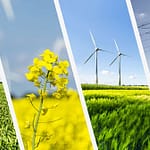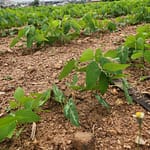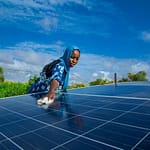Likpata, a community in Edu local government area of Kwara State, North Central Nigeria, is taking proactive measures to tackle the challenges posed by climate change by embracing dry season farming. Facing recurrent flooding due to excessive rainfall and the overflow of River Niger, farmers in Likpata have adopted new agricultural practices to sustain their livelihoods.
Traditionally, the farming season in Likpata spanned from May to September, relying heavily on the rainy season for crop cultivation. However, the changing climate has turned the once beneficial rains into a curse, resulting in frequent flooding, reduced yields, and substantial income loss for farmers in the community.
To address these challenges, Likpata farmers have shifted their focus to dry season farming, which involves cultivating crops during the dry months using irrigation techniques. Collaborating with local non-governmental organizations (NGOs) and government agencies, farmers have received education on the advantages of dry season farming and training on implementing these new techniques.

“The dry season farming has been a lifesaver for us,” said Alhaji Jubrin Mohammed, a farmer and community head of Likpata. He further explained, “We can now grow crops when the rain is less and volume of water in the river Niger is reduced, and sell them at a higher price during the off-season when there is less competition.”
One of the techniques being used is drip irrigation, a system of delivering water directly to the roots of plants through a network of pipes and emitters. This method is more efficient than traditional flood irrigation, which can waste water and lead to soil erosion.
“The government and the Emir of Lafiagi have been very supportive of our efforts to adapt to climate change,” said Mohammed Jiya, another farmer in the community. He added, “We now have access to food and extra to sell in the market, which has made a huge difference to our livelihoods.”
The Kwara State Government has played a crucial role in supporting Likpata’s community efforts. “The agricultural sector is central to the policy of our government, which is why we are mounting direct efforts in revitalizing the sector by enabling the farmers to gain self-reliance and economic empowerment,” explained Governor AbdulRahman AbdulRazaq.

Likpata’s success in dry season farming has also received commendation from rice farmers benefitting from the government’s agricultural inputs and irrigation equipment empowerment program. The farm leader, Isiaka Yusuf, stated, “The irrigation empowerment programme has changed the face of rice production. Our vision is to establish a rice industrial estate in the state.”
The Nigerian Meteorological Agency (NiMet) has also encouraged farmers and stakeholders in the agricultural sector to seize the opportunities presented by dry season farming. “Dry season farming seems to be more productive, and the risk associated with weather is less during the dry season. So, if people that have been affected are encouraged to go into dry season farming, you will find out that the effect on livelihood and food and nutrition insecurity in the country will be reduced,” explained Prof. Mansur Bako Matazu, the Director General of NiMet.
Read also:
African Women Leaders Rally Against Climate Change’s Impact on Women and Girls
Women’s Empowerment in Agriculture: Driving Agri-Business Success
While the shift to dry season farming has brought benefits such as increased food security and reduced migration, challenges persist. The high cost of irrigation equipment and the need for further training and education on dry season farming techniques remain obstacles. Additionally, inadequate infrastructure, such as the lack of a proper road network for transporting yields to the market, can undermine the gains made through dry season farming.
To address these challenges, Likpata’s success story should inspire other flood-prone communities to explore similar strategies for adapting to climate change and ensuring a sustainable future. With the support of governments, NGOs, and stakeholders, communities can thrive amidst a changing climate and build resilience for themselves, their families, and the nation as a whole.
Edited Irene David-Arinze
Published by Samwel Eviator
Subscribe to LIDA NETWORK












